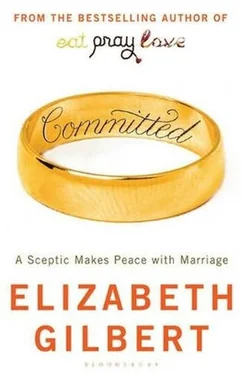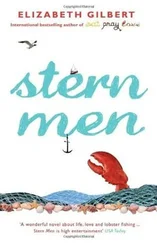I’m not saying that these women don’t love their husbands, or that they never had loved them, or that they never could. That would be a ridiculous thing to infer, because people everywhere love each other and always have. Romantic love is a universal human experience. Evidence of passion exists in all corners of this world. All human cultures have love songs and love charms and love prayers. People’s hearts get broken across every possible social, religious, gender, age, and cultural boundary. (In India, just so you know, May 3 is National Broken Hearts Day. And in Papua New Guinea, there exists a tribe whose men write mournful love songs called namai, which tell the tragic stories of marriages which never came to pass but should have.) My friend Kate once went to a concert of Mongolian throat singers who were traveling through New York City on a rare world tour. Although she couldn’t understand the words to their songs, she found the music almost unbearably sad. After the concert, Kate approached the lead Mongolian singer and asked, “What are your songs about?” He replied, “Our songs are about the same things that everyone else’s songs are about: lost love, and somebody stole your fastest horse.”
So of course the Hmong fall in love. Of course they feel preference for one person over another person, or miss a beloved one who has died, or find that they inexplicably adore somebody’s particular smell, or laugh. But perhaps they don’t believe that any of that romantic love business has very much to do with the actual reasons for marriage. Perhaps they do not assume that those two distinct entities (love and marriage) must necessarily intersect-either at the beginning of the relationship or maybe ever at all. Perhaps they believe that marriage is about something else altogether.
If this sounds like a foreign or crazy notion, remember that it wasn’t so long ago that people in Western culture held these same sorts of unromantic views about matrimony. Arranged marriage has never been a prominent feature of American life, of course-much less bridal kidnapping-but certainly pragmatic marriages were routine at certain levels of our society until fairly recently. By “pragmatic marriage,” I mean any union where the interests of the larger community are considered above the interests of the two individuals involved; such marriages were a feature of American agricultural society, for instance, for many, many generations.
I personally know of one such pragmatic marriage, as it turns out. When I was growing up in my small town in Connecticut, my favorite neighbors were a white-haired husband and wife named Arthur and Lillian Webster. The Websters were local dairy farmers who lived by an inviolable set of classic Yankee values. They were modest, frugal, generous, hardworking, unobtrusively religious, and socially discreet members of the community who raised their three children to be good citizens. They were also enormously kind. Mr. Webster called me “Curly” and let me ride my bike for hours on their nicely paved parking lot. Mrs. Webster-if I was very good-would sometimes let me play with her collection of antique medicine bottles.
Just a few years ago, Mrs. Webster passed away. A few months after her death, I went out to dinner with Mr. Webster, and we got to talking about his wife. I wanted to know how they had met, how they had fallen in love-all the romantic beginnings of their life together. I asked him all the same questions, in other words, that I would eventually ask the Hmong ladies in Vietnam, and I got the same sorts of replies-or lack of replies. I couldn’t dredge up a single romantic memory from Mr. Webster about the origins of his marriage. He couldn’t even remember the precise moment when he had first met Lillian, he confessed. She had always been around town, as he recalled. It was certainly not love at first sight. There was no moment of electricity, no spark of instant attraction. He had never become infatuated with her in any way.
“So why did you marry her?” I asked.
As Mr. Webster explained in his typically open and matter-of-fact Yankee manner, he had gotten married because his brother had instructed him to get married. Arthur was soon going to be taking over the family farm and therefore he needed a wife. You cannot run a proper farm without a wife, any more than you can run a proper farm without a tractor. It was an unsentimental message, but dairy farming in New England was an unsentimental business, and Arthur knew his brother’s edict was on target. So, the diligent and obedient young Mr. Webster went out there into the world and dutifully secured himself a wife. You got the feeling, listening to his narrative, that any number of young ladies might have gotten the job of being “Mrs. Webster,” instead of Lillian herself, and it wouldn’t have made a huge difference to anyone at the time. Arthur just happened to settle on the blonde one, the one who worked over at the Extension Service in town. She was the right age for it. She was nice. She was healthy. She was good. She would do.
The Websters’ marriage, therefore, clearly did not launch from a place of passionate, personal, and fevered love-no more than the Hmong grandmother’s marriage had. We might therefore assume, then, that such a union is “a loveless marriage.” But we have to be careful about drawing such assumptions. I know better, at least when it comes to the case of the Websters.
In her waning years, Mrs. Webster was diagnosed with Alzheimer’s disease. For almost a decade, this once-powerful woman wasted away in a manner that was agonizing to watch for everyone in the community. Her husband-that pragmatic old Yankee farmer-took care of his wife at home the entire time she was dying. He bathed her, fed her, gave up freedoms in order to keep watch over her, and learned to endure the dreadful consequences of her decay. He tended to this woman long after she knew who he was anymore-even long after she knew who she herself was anymore. Every Sunday, Mr. Webster dressed his wife in nice clothing, put her in a wheelchair, and brought her to services at the same church where they had been married almost sixty years earlier. He did this because Lillian had always loved that church, and he knew she would’ve appreciated the gesture if only she had been conscious of it. Arthur would sit there in the pew beside his wife, Sunday after Sunday, holding her hand while she slowly ebbed away from him into oblivion.
And if that isn’t love, then somebody is going to have to sit me down and explain to me very carefully what love actually is.
That said, we have to be careful, too, not to assume that all arranged marriages across history, or all pragmatic marriages, or all marriages that begin with an act of kidnapping, necessarily resulted in years of contentment. The Websters were lucky, to an extent. (Though they also put a good deal of work into their marriage, one suspects.) But what Mr. Webster and the Hmong people perhaps have in common is a notion that the emotional place where a marriage begins is not nearly as important as the emotional place where a marriage finds itself toward the end, after many years of partnership. Moreover, they would likely agree that there is not one special person waiting for you somewhere in this world who will make your life magically complete, but that there are any number of people (right in your own community, probably) with whom you could seal a respectful bond. Then you could live and work alongside that person for years, with the hope that tenderness and affection would be the gradual outcome of your union.
At the end of my afternoon’s visit at Mai’s family’s house, I was granted the clearest possible insight into this notion when I asked the tiny old Hmong grandmother one final question, which again, she thought bizarre and foreign.
Читать дальше












